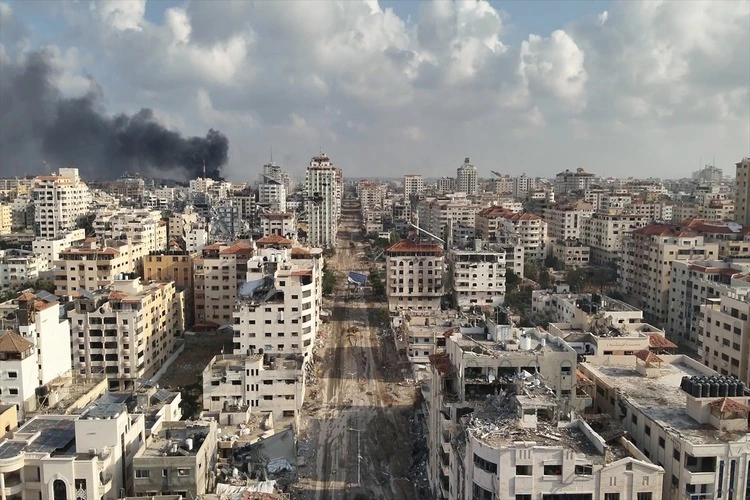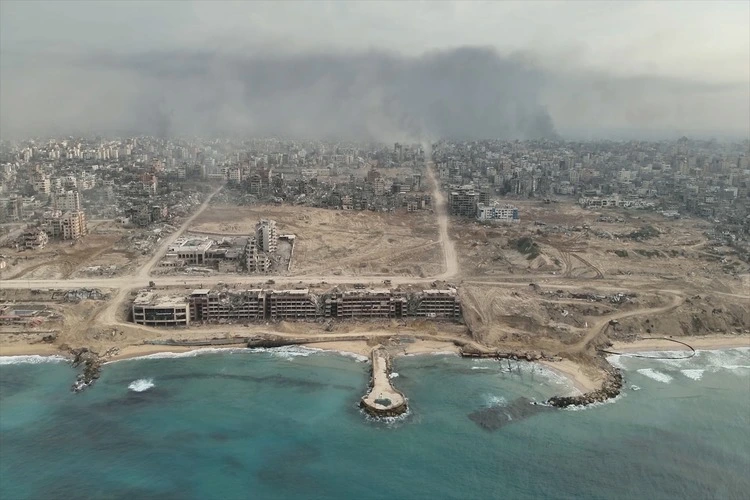
Despite overwhelming violence and despair, civil society leaders across Israel and Palestine are working together to demand a lasting peace

By Maya Savir
Maya Savir is Israel Country Director for Search for Common Ground, the world’s largest dedicated peacebuilding organisation. She is a well-respected author, speaker and leader based in Tel Aviv, specialising in human rights, development, conflict resolution and peace building
Nearly 60,000 Palestinians are thought to have died in the Gaza war, more than 17,000 of them children. More than 2,000 Israelis are believed to have died. Of the 251 Israelis who were kidnapped, 50 are still being held hostage.
Israel’s military has left virtually no infrastructure intact in Gaza. Most hospitals have been destroyed, and those still operating do so without the bare necessities of proper medicine and medical equipment. Nearly 500 aid workers have been killed, along with more than 200 journalists. Drinking water and food are scarce. Two million people – virtually the entire Gazan population – have been displaced. Children and babies are failing to get the nutrients they need to survive.
Related reads:
Frequent news reports say more Palestinian children have been killed by Israeli air strikes while queuing for nutritional supplements at aid stations that have become death traps. This apocalyptic scene has become a daily occurrence. As an Israeli and as a Jew, I am heartbroken and ashamed.
The world’s gaze often stops here: the sickening death toll in Gaza, the destruction, the hunger, the displacement, the children and – depending on the viewer’s politics
– the torture of the Israeli hostages and their families, the missile attacks, the displacement, and the shrinking freedoms of Israelis under their government.
But a closer look reveals that even now, within Israel and Palestine, there are women and men who haven’t given up on peace. People who know that an immediate and permanent ceasefire, one that includes a hostage deal and humanitarian aid to Gaza, is a necessary first step – but it is only that, a first step. The two peoples who inhabit this land – the Israelis and the Palestinians – deserve peace, which can only be delivered through a truly transformative, lasting and inclusive peace process.
The women and men of the Israeli and Palestinian peace camps know that amid the catastrophe they’re living in lies an opportunity to make this war not just the latest in the Israeli–Palestinian conflict, but the last one between us.

In Israel, more than 60 civil society organisations have come together to form the ‘It’s Time’ coalition, which is calling for an immediate ceasefire, an end to the war, an end to occupation, and peace based on security, equality and justice.
The coalition has hosted events and marches across Israel that have been attended by thousands of Jews and Arabs alike, and it’s working in collaboration with civil society organisations in Palestine.
In June, I was part of a delegation of hundreds of Palestinian and Israeli civil society leaders who attended a summit in Paris where French President Macron spoke of his commitment to peace and the importance of civil society organisations in shaping it, and in maintaining dialogue even when it doesn’t take place at the governmental level.
The organisations in the coalition take on a variety of roles. Some are focused on building relationships between Jews and Arabs. Some, like mine – Search for Common Ground – are cross-border organisations working in Israel and Palestine to build a lasting peace. Others focus on human rights and ending the occupation, social justice and involving communities that are traditionally excluded from the peace process.
When I read the news, I’m struck by the false narrative that ending the war in Gaza is purely a matter of negotiation between a handful of men (always men). But we know from previous peace processes around the world that women and civil society organisations play an essential
role in creating a language and climate of peace. These voices understand that war isn’t inevitable, and they demand that an agreement represents all of society.
Search for Common Ground has been working to establish and maintain peace for more than four decades in some of the world’s most conflict-affected regions. In that time, one of the golden rules we’ve learned is that peace belongs to the people, and that their participation in shaping it is key to its sustainability. Peace agreements may be signed in grand rooms with high dignitaries, but they are lived on the streets and within the communities of those affected by violence.
To secure a peace that stands the test of time, political leadership must involve the people for whom it’s being struck – so their voices are irreversibly woven into it. Israeli and Palestinian activists in the peace camp haven’t given up. Neither should regional and international leaders. Peace is possible – and we will make it happen.




